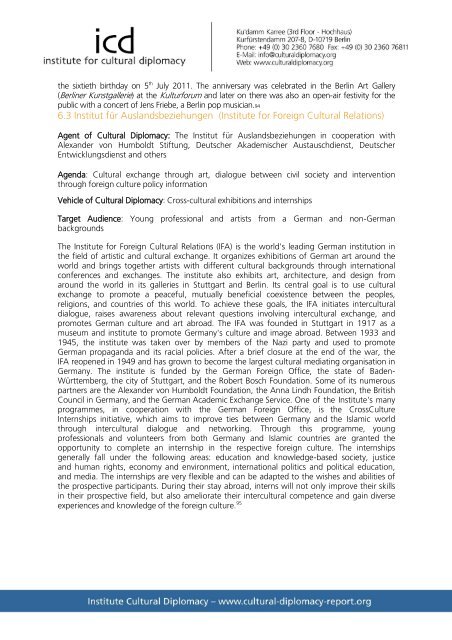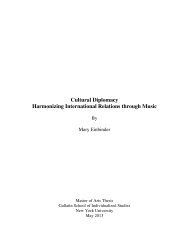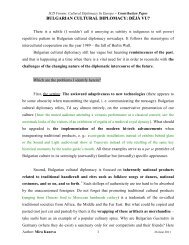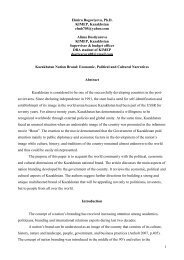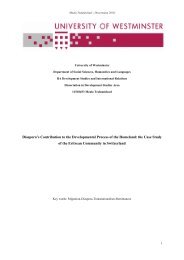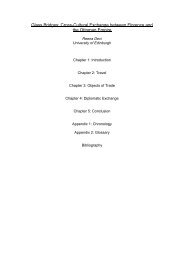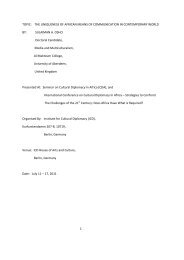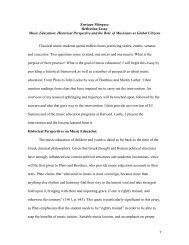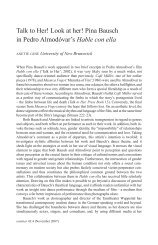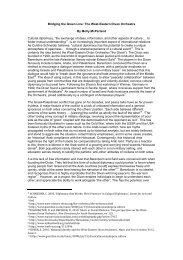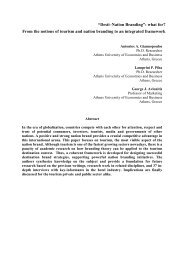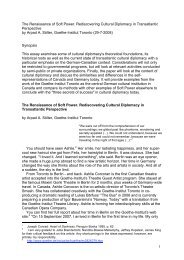Country Profiles: Germany - Institute for Cultural Diplomacy
Country Profiles: Germany - Institute for Cultural Diplomacy
Country Profiles: Germany - Institute for Cultural Diplomacy
You also want an ePaper? Increase the reach of your titles
YUMPU automatically turns print PDFs into web optimized ePapers that Google loves.
the sixtieth birthday on 5 th July 2011. The anniversary was celebrated in the Berlin Art Gallery<br />
(Berliner Kunstgallerie) at the Kultur<strong>for</strong>um and later on there was also an open-air festivity <strong>for</strong> the<br />
public with a concert of Jens Friebe, a Berlin pop musician.94<br />
6.3 Institut für Auslandsbeziehungen (<strong>Institute</strong> <strong>for</strong> Foreign <strong>Cultural</strong> Relations)<br />
Agent of <strong>Cultural</strong> <strong>Diplomacy</strong>: The Institut für Auslandsbeziehungen in cooperation with<br />
Alexander von Humboldt Stiftung, Deutscher Akademischer Austauschdienst, Deutscher<br />
Entwicklungsdienst and others<br />
Agenda: <strong>Cultural</strong> exchange through art, dialogue between civil society and intervention<br />
through <strong>for</strong>eign culture policy in<strong>for</strong>mation<br />
Vehicle of <strong>Cultural</strong> <strong>Diplomacy</strong>: Cross-cultural exhibitions and internships<br />
Target Audience: Young professional and artists from a German and non-German<br />
backgrounds<br />
The <strong>Institute</strong> <strong>for</strong> Foreign <strong>Cultural</strong> Relations (IFA) is the world's leading German institution in<br />
the field of artistic and cultural exchange. It organizes exhibitions of German art around the<br />
world and brings together artists with different cultural backgrounds through international<br />
conferences and exchanges. The institute also exhibits art, architecture, and design from<br />
around the world in its galleries in Stuttgart and Berlin. Its central goal is to use cultural<br />
exchange to promote a peaceful, mutually beneficial coexistence between the peoples,<br />
religions, and countries of this world. To achieve these goals, the IFA initiates intercultural<br />
dialogue, raises awareness about relevant questions involving intercultural exchange, and<br />
promotes German culture and art abroad. The IFA was founded in Stuttgart in 1917 as a<br />
museum and institute to promote <strong>Germany</strong>'s culture and image abroad. Between 1933 and<br />
1945, the institute was taken over by members of the Nazi party and used to promote<br />
German propaganda and its racial policies. After a brief closure at the end of the war, the<br />
IFA reopened in 1949 and has grown to become the largest cultural mediating organisation in<br />
<strong>Germany</strong>. The institute is funded by the German Foreign Office, the state of Baden-<br />
Württemberg, the city of Stuttgart, and the Robert Bosch Foundation. Some of its numerous<br />
partners are the Alexander von Humboldt Foundation, the Anna Lindh Foundation, the British<br />
Council in <strong>Germany</strong>, and the German Academic Exchange Service. One of the <strong>Institute</strong>'s many<br />
programmes, in cooperation with the German Foreign Office, is the CrossCulture<br />
Internships initiative, which aims to improve ties between <strong>Germany</strong> and the Islamic world<br />
through intercultural dialogue and networking. Through this programme, young<br />
professionals and volunteers from both <strong>Germany</strong> and Islamic countries are granted the<br />
opportunity to complete an internship in the respective <strong>for</strong>eign culture. The internships<br />
generally fall under the following areas: education and knowledge-based society, justice<br />
and human rights, economy and environment, international politics and political education,<br />
and media. The internships are very flexible and can be adapted to the wishes and abilities of<br />
the prospective participants. During their stay abroad, interns will not only improve their skills<br />
in their prospective field, but also ameliorate their intercultural competence and gain diverse<br />
experiences and knowledge of the <strong>for</strong>eign culture. 95


